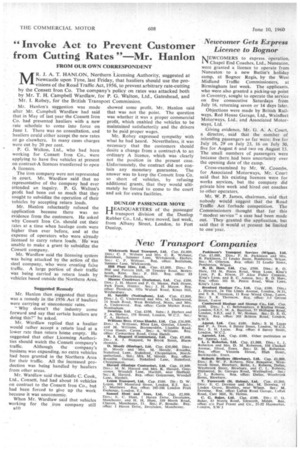"Invoke Act to Prevent Customer from Cutting Rates" Mr. Hanlon
Page 44

If you've noticed an error in this article please click here to report it so we can fix it.
FROM OUR OWN CORRESPONDENT MR. J. A. T. HANLON, Northern Licensing Authority, suggested at Newcastle upon Tyne, last Friday, that hauliers should use the provisions of the Road Traffic Act, 1956, to prevent arbitrary rate-cutting by the Consett Iron Co. The company's policy on rates was attacked both by Mr. T. H. Campbell Wardlaw, for P. G. Walton, Ltd., Gateshead, and Mr. I. Robey, for the British Transport Commission.
Mr. Hanlon's suggestion was made after Mr. Campbell Wardlaw had said that in May of last year the Consett Iron Co. had presented hauliers with a new rate schedule to come into force on June 1. There was no consultation, and • hauliers could either accept the new rates or go elsewhere. In many cases charges were cut by 20 per cent. P. G. Walton, Ltd., who had been working for Consett Iron Co., were applying to have five vehicles at present on contract-A licences transferred to open A licences. The iron company were not represented in. court. Mr. Wardlaw said that no representative of the company had ever attended an inquiry. P. G. Walton's profit had been cut so much that they sought to subsidize the operation of their vehicles by accepting return loads. Mr. Hanlon reluctantly refused the application because there was no evidence from the customers. He asked why Consett Iron Co. should cut their rates at a time when haulage costs were higher than ever before, and at the expense of operators who were already licensed to carry return loads. He was unable to make a grant to subsidize the
Consett company. •
Mr. Wardlaw said the licensing system was being attacked by the action of the steel company, who were creating false traffic. A large portion of their traffic was being carried as return loads by vehicles based outside the Northern Area.
Suggested Remedy
Mr. Hanlon then suggested that there was a remedy in the 1956 Act if hauliers were carrying at uneconomic rates. " Why doesn't the industry come forward and say that certain hauliers are doing this?" he asked. . Mr. Wardlaw replied that a haulier. would rather accept a return load at a lower rate than return home empty. He suggested that otherLicensing Authorities should watch the Consett company's traffic. Although the cortipany's business was expanding, no extra vehicles had been granted in the Northern Area for their traffic. All the increased production was being handled by hauliers from other areas. Mr. Wardlaw said that Siddle C. Cook, Ltd.. Consett, had had about 16 vehicles on contract to the Consett Iron Co., but had been forced to give up the work because it was uneconomic. When Mr. Wardlaw said that vehicles working for the iron company still l0 showed some profit, Mr. Hanlon said that was not the point. The question was whether it was a proper commercial profit, which enabled the vehicles to be maintained satisfactorily and the drivers to be paid proper wages. Mr. Rohey expressed sympathy with what he had heard. Nevertheless, it was necessary that the customers should desire a change from a contract-A to an ordinary A licence, which was clearly not the position in the present case. Unfortunately, the contract did not contain any monetary guarantee. The answer was to keep the Consett Iron Co. so short of vehicles, by refusing additional grants, that they would ultimately be forced to come to the court and ask for extra facilities.
DUNLOP PASSENGER MOVE
HEADQUARTERS of the passenger transport division of the Dunlop Rubber Co., Ltd., were moved, last week, from Albany Street, London, to Fort Dunlop.




















































































































































